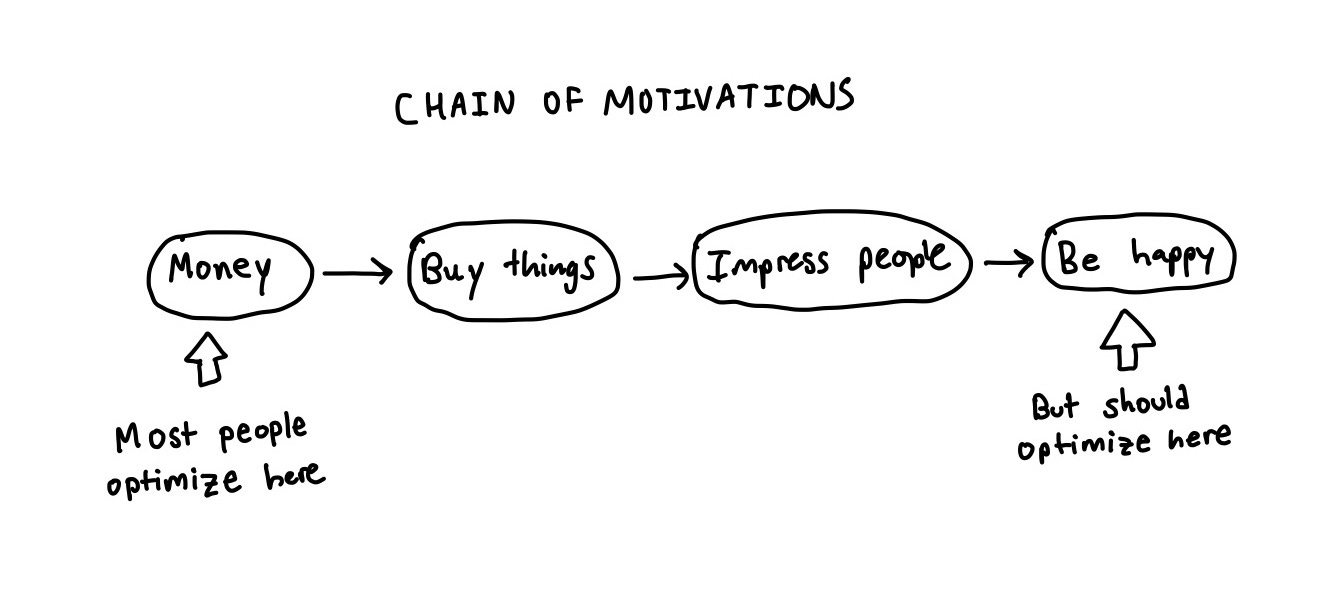When evaluating the progression of life, there are two distinct ways of measuring progress. The one most people think of is peaks. What is the frequency and magnitude of high-impact events if your life? Peaks would include landing a dream job, starting a new relationship, or moving to a new city. Basically, any major life event that contributes significantly to big-picture life goals or an event symbolic of significant progress (i.e., a milestone event).
The other metric of life is baseline enjoyment. No one can peak every day or every week. Even for the most successful people, peaks aren't a regular occurrence. Baseline enjoyment measures the quality of the time in between peaks. The day-to-day, the grind, the majority of your existence.
There seems to be a bias towards measuring life with peaks. People who achieve the highest peaks at the fastest pace are considered the most successful. I have a few theories for why this is the case. First, it's harder to measure baseline enjoyment. And, because it's harder to measure, it's harder to compare and see how people stack up against each other. Peaks, on the other hand, are visible and often zero-sum. Second, peaks are motivating. They can give our day-to-day activities direction. It's harder to motivate yourself by making a single day as productive or enjoyable as possible because only so much can happen in one day.
While peaks are a good sign that you're on track with big-picture life goals, they aren't the best metric for overall quality of life. You can achieve milestones with frequency but also feel miserable. Jeff Bezos is absurdly rich, but he's also divorced. The people reaching the highest peaks aren't always the ones finding the most enjoyment or meaning in what they do. But what if there was a way to have the achievement of peaks be correlated with quality of life?
Defining big-picture life goals
I've been throwing around the term "big-picture life goals" without too much clarification, even though it's a key part of the puzzle to measuring progress in life. For many people, there is a belief that if we achieve peaks, our day-to-day experiences will somehow fall into place. The crux of the issue lies in what our big-picture goals are.
In the book Anything You Want, Derek Sivers presents the idea that we should strive to be something rather than have something.
In the end, it's about what you want to be, not what you want to have. To have something (a finished recording, a business, or millions of dollars) is the means, not the end. To be something (a good singer, a skilled entrepreneur, or just plain happy) is the real point. When you sign up to run a marathon, you don't want a taxi to take you to the finish line.
This idea can be taken a step further. For most people, the ultimate end goal is to be happy. Even when we say we want to become a singer or entrepreneur, it's because we think becoming the thing will make us happy. Happiness is the level zero motivation. It's the final destination, and everything else is just a way to get there. Contributing to a project you care about, cultivating relationships, or giving back to your community are all means to happiness. The same goes for money, status, and material possessions. We go after them because we think they will make us happy, but they are not ends by themselves.
So what does a big-picture life goal have to do with this? A big-picture life goal is what you think will make you happy. And not just happy for the next month or year. What makes you happy every day and will continue to make you happy for a lifetime? Note that the inclusion of "what makes you happy every day" makes answering this question trickier. Big-picture life goals are broad. Skydiving might make you happy for a day, but becoming someone who pushes the limits of human experience could be the big-picture goal that makes you happy every day of your life.
Mode shift
One way to find your big-picture goal is to think more in terms of baseline enjoyment than peaks. Peaks encourage us to optimize for outcomes. Baseline enjoyment encourages us to optimize for the process. The act of reaching peaks doesn't create meaning on its own. But if you find joy in the process of working towards a peak, you've just found a way to constantly derive meaning and enjoyment from what you do. The way to have a lifetime of happiness is to align the pursuit of peaks with what makes you happy every day.
There has been a lot of research on this. The largest and most comprehensive study on human happiness found that relationships are the foundation of happiness. For most people, if you have people you can count on and enjoy spend time with, it will lead to happiness.
I think this is a somewhat incomplete conclusion, however. This study tells us that of all the various aspects of life, relationships contribute the most to happiness. But other parts need to be addressed as well. In addition to having strong relationships, people want to impact the world and experience incredible things. This is where it gets more individual. Some of my friends know that starting a family and becoming a parent is their ultimate big-picture life goal and what will ultimately bring them happiness. Other people really want to build things, teach people, or learn as much as possible. Whatever makes you happy, it's important that your peaks are a measurement of progress towards your big-picture goal. Otherwise, you'll waste time going after things you don't really want.
Additional reading and listening
Happiness and success are subjects I've researched and thought about a ton. Here are some of the books, articles, and podcasts that have informed my perspective:
Books
Flow: The Psychology of Optimal Experience by Mihaly Csikszentmihalyi
The Courage to Be Disliked: How to Free Yourself, Change your Life and Achieve Real Happiness by Ichiro Kishimi and Fumitake Koga
Anything You Want by Derek Sivers
A Million Miles in a Thousand Years: What I learned While Editing My Life by Donald Miller
Articles
Mimetic Traps by Brian Timar
How To Do What You Love by Paul Graham
Podcasts
Happiness (Naval)
The Pathless Path (Not Overthinking)
How to Get Rich (Naval)




